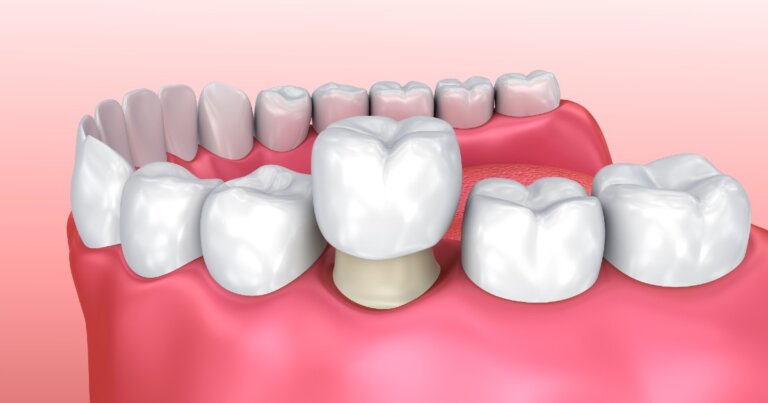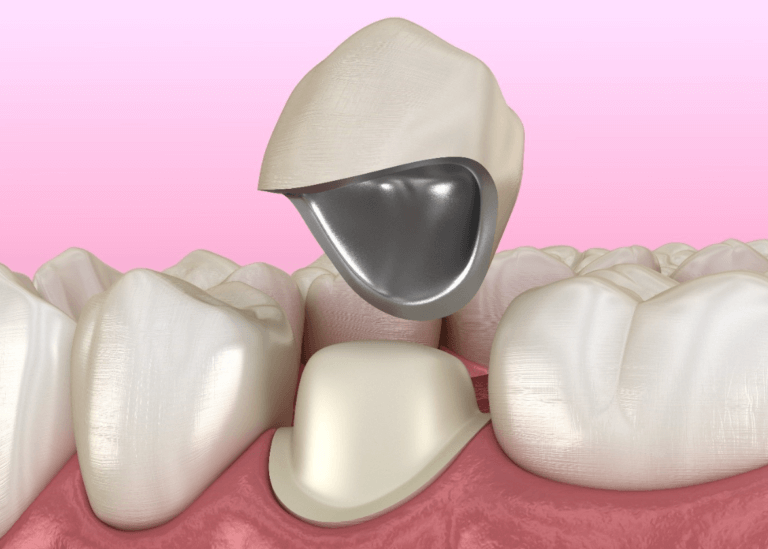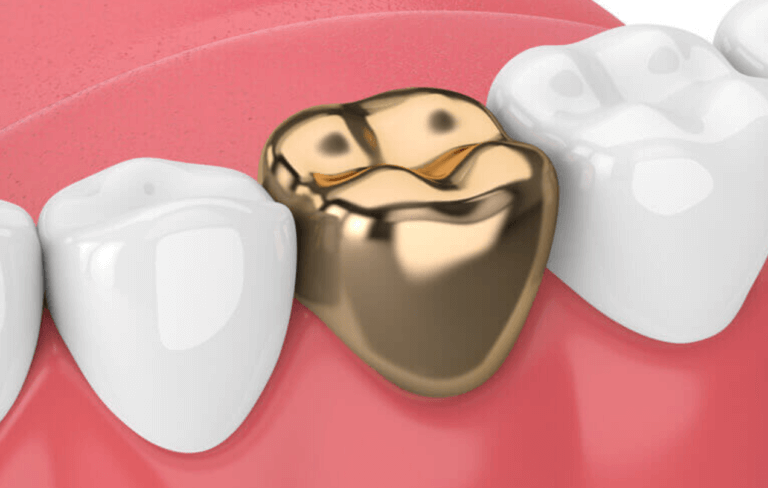Dental Crown Recementation

What Is Dental Crown Recementation?
Dental crown recementation involves reattaching a dental crown that has come loose or dislodged from its position. It is a common, quick, and effective procedure that preserves both the function and appearance of your tooth. More importantly, it helps prevent further oral health issues, such as decay or damage to the underlying tooth.
Before deciding on whether Dental Crown Recementation is right for you, there are some things you should know:
- When Do You Need Dental Crown Recementation?
- Benefits of Dental Crown Recementation
- Alternative Treatments for Loose Crowns
- How Much Does Dental Crown Recementation Cost?
- What Happens During a Dental Crown Recementation?
- Frequently Asked Questions About Dental Crown Recementation
If you have any further questions about Dental Crown Recementation or other dental services offered at Atlas Dental, please contact us.

Free phone consultation
Have a question about Dental Crowns? Schedule a free phone consultation with our cosmetic dentist.

5 star google reviews
Our patients love us! See for yourself why patients are choosing Atlas Dental for their Dental Crowns.

Book Emergency Crown Visit online
Have a chipped or broken tooth and need a dental crown? Book online for emergency dental crown treatment.
When Do You Need Dental Crown Recementation?
Several situations may call for dental crown recementation, including:
- Wear and Tear: Over time, the cement holding the crown in place can weaken due to regular chewing, grinding, or biting on hard objects.
- Tooth Decay: New cavities beneath the crown can compromise its stability, requiring recementation.
- Accidents or Trauma: An impact from a fall or sports injury can knock the crown loose.
- Improper Fit: Sometimes, the initial bonding process isn’t as strong, leading to a crown coming off prematurely.
If you notice your dental crown feels loose or has fallen off, it’s important to contact your dentist immediately. Ignoring it could expose the underlying tooth to damage or infection. If you have further questions about Dental Crown Recementation, please contact us.
Benefits of Dental Crown Recementation
Prompt dental crown recementation offers several important advantages:
- Protects Your Tooth: A loose crown can lead to further decay, infection, or structural damage to the underlying tooth. Reseating the crown keeps the tooth safe from these risks.
- Restores Functionality: Loose crowns can make eating and speaking uncomfortable. Reseating the crown brings back normal function without discomfort.
- Prevents Sensitivity: Exposed tooth structure under a loose crown can cause sensitivity to temperature or sweets, which recementation can prevent.
- Cost-Effective Solution: Reseating a crown is less expensive than a full crown replacement or more extensive procedures that might be required if the issue is left untreated.
It’s important to remember that dental crown recementation should only be performed by a qualified dentist. Attempting to fix a loose crown at home or delaying professional treatment can lead to complications. If you have further questions about Dental Crown Recementation, please contact us.

Alternative Treatments for Loose Crowns
If you decide not to go ahead with dental crown recementation, your dentist may recommend alternative treatments such as:
- Crown Replacement: If the original crown is damaged or no longer fits properly, replacing it with a new crown may be necessary.
- Tooth Extraction: In severe cases where the tooth beneath the crown is extensively damaged, extraction may be required.
- Dental Implant or Bridge: If the tooth is extracted, a dental implant or bridge can be used to replace the missing tooth.
Dental professionals will carefully assess your oral health, the condition of the crown, and the underlying tooth before recommending the most suitable course of action. If you have further questions about Dental Crown Recementation, please contact us.
Cost of Recementation for Inlays/Onlays/Crowns/Veneers
The cost of a recementing an Inlay, Onlay, Crown or Veneer starts at $221 and up, depending on the amount of time it takes the dentist to perform this procedure. Normally, it takes 30 minutes, and would cost $221 for one. The codes relevant to dental crowns in the Ontario Dental Association’s Suggested Fee Guide appear as follows:
Recementation/Rebonding, Inlays/Onlays/Crowns/Veneers/Posts/Natural Tooth Gragments (single units only)
- 29102 – Two Unit of Time (30 minutes): $221
- 29103 – Three Unit of Time (45 minutes): $316
- 29104 – Four Unit of Time (60 minutes): $412
The recementation of single unit dental prostheses is usually considered a basic restorative procedure covered by your dental insurance. Be sure to find out from your dental insurance plan provider how much you are eligible for before going ahead with dental treatment. Your dentist can help you submit an predetermination to your dental insurance. Our fees are consistent with the ODA Fee Guide.
For patients without dental insurance, Atlas Dental is pleased to offer dental financing through iFinance Dentalcard. Affordable payment plans start at 7.95% for terms of 6 months to 6 years. To learn more about Dentalcard dental treatment financing, follow this link.
What Happens During a Dental Crown Recementation?
The dental crown recementation procedure is straightforward and involves these key steps:
- Assessment and X-Rays: Your dentist will examine the loose crown and the underlying tooth. X-rays may be taken to check for decay or damage beneath the crown.
- Cleaning: The dentist will remove any old cement or debris from the tooth and the inside of the crown.
- Crown Recementation: Special dental cement is applied to the inside of the crown, which is then carefully placed back onto the tooth.
- Bite Check: Your dentist will ask you to bite down to ensure the crown fits correctly.
- Final Adjustments: Any necessary adjustments are made to ensure comfort and proper function.
- Curing and Polishing: The cement is hardened with a curing light, and the crown is polished for a smooth, natural finish.
If you experience any discomfort or notice any issues with your recemented crown after the procedure, it’s important to contact your dentist promptly for further evaluation and adjustments. If you have further questions about Dental Crown Recementation, please contact us.

Frequently Asked Questions About Dental Crown Recementation
- Is it safe to eat or drink if my crown has fallen off?
It’s advisable to avoid chewing on the affected side and to choose soft foods until you can see your dentist. Avoiding very hot or cold foods can also help prevent sensitivity.
- Can I use over-the-counter dental cement to reattach my crown temporarily?
While some temporary dental cements are available, it’s best to consult your dentist before attempting any self-repair to avoid further complications.
- How can I prevent my dental crown from becoming loose again?
Maintaining good oral hygiene, avoiding hard or sticky foods, and attending regular dental check-ups can help prolong the life of your crown.
- Will recementation make my crown feel like new?
If the underlying tooth structure is healthy and the crown is undamaged, recementation should restore the crown’s original fit and function.
Recementing a dental crown is a straightforward procedure that can restore your tooth’s function and protect it from further damage. If you have further questions about Dental Crown Recementation, please contact us.

